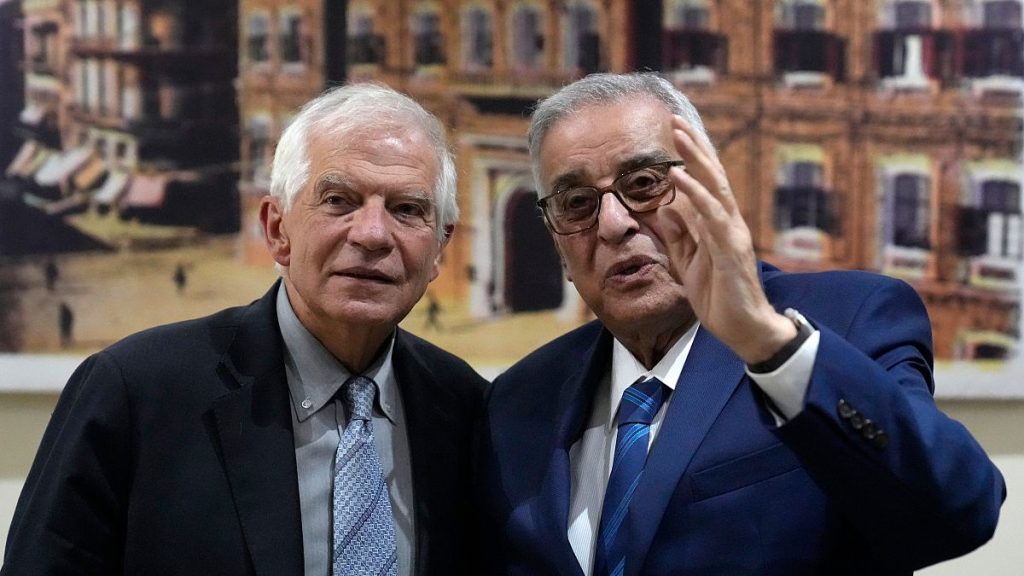EU foreign policy chief Josep Borrell visited Lebanon to discuss regional issues, particularly escalating conflict in the Middle East. Borrell urged Lebanon and Israel to de-escalate tensions along the border, as members of the militant Hezbollah group and Israel’s military engaged in cross-border attacks. Despite efforts by Western and Arab officials to ease tensions, Hezbollah has stated that attacks will only stop if Israel halts its Gaza offensive. Borrell expressed concern about the growing fears and escalation in the region since his last visit in January, emphasizing the need for a diplomatic solution to restore stability.
During his visit, Borrell also met with peacekeepers from the 16 EU nations contributing to the United Nations Interim Force in Lebanon (UNIFIL), which operates under the EU’s Resolution 1701. This resolution calls for a complete cessation of hostilities between Israel and Hezbollah, highlighting the importance of the EU’s support for the Lebanese people and efforts towards a diplomatic solution. Borrell emphasized the need to de-escalate military tensions and urged all sides to pursue this path, pointing out the potential for widespread human suffering if the conflict continues to escalate.
The EU’s foreign policy chief has been vocal in his criticism of the Israeli government over the war in Gaza, describing the crisis in the Palestinian territory as a “human-made tragedy”. Borrell’s visit to Lebanon comes amid ongoing violence in the region and heightened tensions between Israel and Hezbollah. He reiterated the importance of finding a peaceful resolution to the conflict, highlighting the risks of further escalation and the potential for a spillover of the war in Gaza. Borrell’s discussions with Lebanese officials focused on ways to ease tensions along the border and prevent further conflict.
Western and Arab officials have been actively engaged in efforts to ease tensions between Lebanon and Israel, with visits to Beirut aimed at promoting dialogue and diplomacy. However, Hezbollah’s insistence on linking the cessation of attacks to Israel halting its Gaza offensive presents a significant challenge to these peace efforts. Borrell’s visit underscored the EU’s commitment to supporting stability in the region and working towards a peaceful resolution to the conflict. The escalation of military tensions in the region has raised concerns about the potential for widespread human suffering and the need for urgent action to de-escalate the situation.
As the high representative for the EU’s foreign affairs and security policy, Borrell has a crucial role in advocating for peace and stability in the Middle East. His visit to Lebanon underscored the EU’s commitment to supporting efforts to de-escalate tensions and find a diplomatic solution to the conflict. Borrell’s meetings with Lebanese officials and peacekeepers from the UNIFIL highlighted the importance of international cooperation in addressing regional challenges and working towards a lasting peace. The EU’s support for Resolution 1701 and its efforts to promote dialogue between Lebanon and Israel demonstrate its commitment to preventing further conflict and protecting the well-being of the Lebanese people.
In conclusion, Borrell’s visit to Lebanon serves as a reminder of the urgent need to de-escalate military tensions in the region and pursue a path of diplomacy and dialogue. The ongoing conflict between Israel and Hezbollah poses a significant threat to stability and the well-being of the Lebanese people. The EU’s support for a diplomatic solution and efforts to ease tensions along the border are crucial in preventing further escalation and promoting peace. Borrell’s discussions with Lebanese officials and peacekeepers underscore the importance of international cooperation in addressing regional challenges and working towards a lasting resolution to the conflict.


